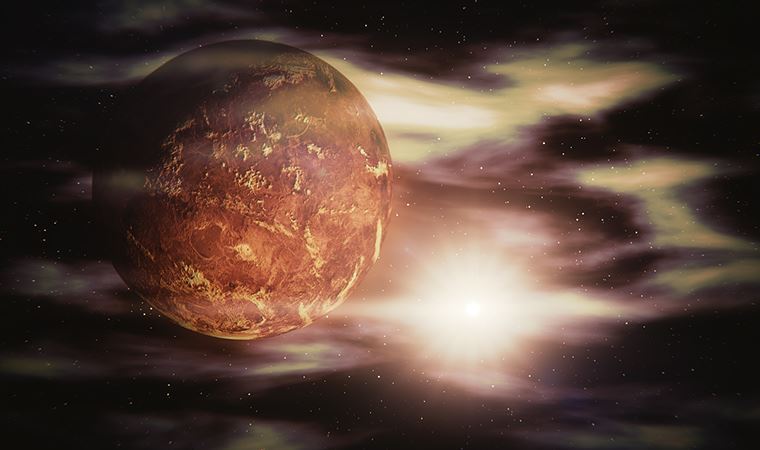In a new study by an international research team from Queen’s University Belfast in Ireland, life is not possible on Venus because its atmosphere is too dry. Last year, phosphine gas, which indicates the existence of life on the planet, was found and hopes were raised that there might be life in its atmosphere.
On the other hand, previous studies have suggested that the concentration of phosphine gas in Venus’ atmosphere cannot be explained by geological activity alone. However, new research casts a shadow on this idea.
“EVEN EXTREME CONDITIONS, SURVIVING IS NOT POSSIBLE”
According to NTV, researchers evaluated what is known about conditions in clouds collected by space probes, as part of the study published in the scientific journal Nature Astronomy. It was stated that the clouds are mostly composed of sulfuric acid and a very small amount of water. Extensive libraries of data on life forms on Earth were then looked at to see if any known organism could survive in this harsh environment.
Researchers say that the most extreme “extremophilin“(the name of microbes that live in very harsh conditions) could not even survive.
THE PRESENCE OF PHOSPHINE GAS DIFFERENT SCIENTISTS IN TWO
From the Belfast School of Biological Sciences, Dr. John Hallsworth”We found that the effective concentration of water molecules is not only slightly below what is required for the most durable microorganism on Earth, but more than 100 times lower. Well below the threshold for life to be active” said.
The discovery of phosphine gas on the planet closest to the Sun last September aroused excitement and curiosity all over the world. On Earth, phosphine is formed by the activities of microbes living in the intestines of animals or in oxygen-poor environments such as swamps and directly indicates the existence of life. It is possible to make the gas industrially, but there is no factory on Venus; so the discovery in the planet’s clouds requires an explanation.
THE PROFESSOR DEFENDING THAT THERE IS LIFE ON VENUS CHALLENGE
In September, the team led by Prof Jane Greaves of Cardiff University raised the possibility of life on Venus and invited other scientists to debunk that theory.
Some astronomers initially questioned the accuracy of phosphine gas observations made with two different telescope systems, but this latest counter-study came from experts working in a very different field: biochemistry researchers.
However, Prof. Dr. Jane Greaves, a microbiologist whose focus is the stress response of living organisms, Dr. He was quick to respond to Hallsworth.
Greaves praised the new work and called it excellent research. But he still thinks there is a possibility of a habitable environment in the Venusian clouds.
“VENUS’ ATMOSPHERE IS DRY, BUT I DO NOT ACCOUNT HOW WELL MIXED IT”
Greaves, “We talked at length about this last year; We know that Venus’ atmosphere is extremely dry, but what we don’t know is how well the gases in this atmosphere mix. My colleague Paul Rimmer has an article showing that some cloud droplets can have very high water content” said.
Greaves highlighted the dark streaks that are sometimes seen in the atmosphere at short time scales in ultraviolet light. He explained that these could be microbial colonies that evolved, disappeared, and then reappeared.
On the other hand, one of the leading figures in astrobiology, a field that studies the possibilities of life beyond Earth, Dr. Chris Mckay said it’s gratifying to think about life on Venus, but direct measurements of the atmosphere made by probes in the past really show that this is unlikely.
EXPLANATION OF LIFE ON JUPITER FROM NASA RESEARCHER
McKay, who is also an American Space and Aviation Agency (NASA) researcher and co-authors of the New Hallsworth study, stated that life may also exist in Jupiter’s cloud layers, although it is very difficult to prove.
Dr. McKay, “To say that a place is uninhabitable, all it takes is to show that some conditions are beyond the range that life can tolerate. Unfortunately we did this for Venus. He also predicts that the water activity in a particular layer on Jupiter is within the range of life. But to show that this layer is habitable, we need to review all the requirements for life and prove that they are all met. So it’s much harder to say that Jupiter’s atmosphere is habitable than it is to say that Venus’ clouds are uninhabitable.” said.
–

:quality(80)/cdn-kiosk-api.telegraaf.nl/0c172b54-d973-11eb-8003-0218eaf05005.jpg)
